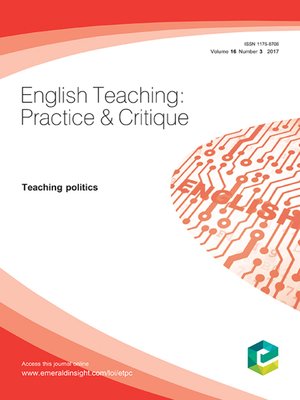English Teaching: Practice & Critique, Volume 16, Number 3
ebook ∣ Teaching politics · English Teaching: Practice & Critique
By Amanda Godley

Sign up to save your library
With an OverDrive account, you can save your favorite libraries for at-a-glance information about availability. Find out more about OverDrive accounts.
Find this title in Libby, the library reading app by OverDrive.



Search for a digital library with this title
Title found at these libraries:
| Library Name | Distance |
|---|---|
| Loading... |
In recent years, the issue of politics has become more central in literacy research. Teachers and researchers have become increasingly aware that literacies are political and ideological and that texts cannot be taught in non-political, non-ideological ways. At the same time, such teaching had become risker in many contexts, as teachers face mounting pressure from administrators, students, parents and sometimes peers to de-politicize their teaching and to avoid controversial social issues. In the wake of racially- and ethnically-motivated violence and displacements, misleading information (often circulated through social media) that contradicts scientific data and knowledge on issues such as climate change, the creation of politically-motivated "professor watchlists," and discussions about religious tolerance worldwide, politics have become both more integrated and central and also more contentious and divisive in ELA classrooms. How do literacy researchers and teachers navigate this tension? The papers in this ebook address issues related to teaching political texts, teaching about politics through English Language Arts, and the politics of literacy teaching. Several of the articles describe how English educators bring reading, writing, and talk about current political issues into their literacy classrooms and how students engage and respond in both personal and analytical ways. Taken together, these studies suggest that the inclusion of current political issues in literacy education provides engaging, meaningful, and rigorous literacy learning opportunities to students of all ages. Other papers describe how teacher educators prepare new teachers to navigate issues of politics, diversity, and racism through their teaching practices. A third set of studies investigate how teachers resist or appropriate broader sociopolitical discourses related to language ideologies, literacy assessment, and standards for learning. Though the research and educator narratives represented in this issue range in topics and settings, one overarching theme emerges: literacy instruction is inherently political, and to suggest otherwise is to ignore a large body of evidence showing the ways in which broader political debates and policies concerning education, human rights, and social justice shape educators' everyday practices.







